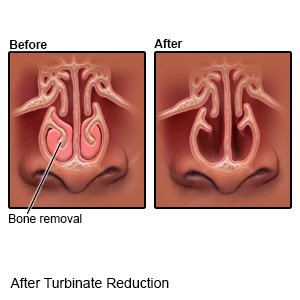Turbinate Reduction
Medically reviewed by Drugs.com. Last updated on Aug 4, 2025.
What do I need to know about turbinate reduction?
Turbinate reduction is surgery to shrink swollen turbinates in your nose. Turbinates are thin bones covered with tissue. Swollen turbinates can block air flow through your nose. This surgery can help you breathe more easily through your nose. Turbinoplasty is most commonly done in adults, but may also be done in children.
 |
How do I prepare for turbinate reduction?
Your healthcare provider will talk to you about how to prepare for surgery. He or she may tell you not to eat or drink anything after midnight on the day of your surgery. He or she will tell you what medicines to take or not take on the day of your surgery. Your provider may tell you to stop taking blood thinners at least a week before surgery. Blood thinners include aspirin, ibuprofen, omega 3, and vitamin E. Tell your provider if you take prescription blood thinners.
What will happen during turbinate reduction?
Local anesthesia is usually given to numb the surgery area. With local anesthesia, you may still feel pressure or pushing during surgery, but you should not feel any pain. You may instead be given general anesthesia to keep you asleep and free from pain during surgery. This surgery will be done through your nostrils. Your surgeon may use heat, cold, mechanical tools, or a laser to destroy some of the tissue on your turbinate. He or she may also remove part or all of the bone. You may have gauze or a soft splint inside your nose to help prevent bleeding.
What will happen after turbinate reduction?
You may have pain, fatigue, and nasal stuffiness after surgery. The nasal stuffiness is caused by swelling in your nose, and will decrease in about 1 week. You may also have mild drainage made up of mucus and blood.
What are the risks of turbinate reduction?
You may bleed more than expected or get an infection. You may also have crusting, dryness, odor, swelling, and scarring in your sinuses after surgery. You may continue to have symptoms, or your symptoms may return. You may need another surgery.
Care Agreement
You have the right to help plan your care. Learn about your health condition and how it may be treated. Discuss treatment options with your healthcare providers to decide what care you want to receive. You always have the right to refuse treatment. The above information is an educational aid only. It is not intended as medical advice for individual conditions or treatments. Talk to your doctor, nurse or pharmacist before following any medical regimen to see if it is safe and effective for you.© Copyright Merative 2025 Information is for End User's use only and may not be sold, redistributed or otherwise used for commercial purposes.
Further information
Always consult your healthcare provider to ensure the information displayed on this page applies to your personal circumstances.
